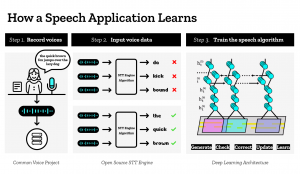The Skepticism to Benefits of AI in Public Lives Is Bigger Than Their True Value to Businesses
Are we slaves to technology, or just their outcomes? Hard to arrive at a conclusion given the dimensions to which technology has crept into our lives.
AI and Machine Learning are the staple topics to discuss for most marketing and sales teams. We know the extent to which AI has proliferated into our businesses, and maybe in our domestic lives too. We work with, we chat, we sleep to, and at times, dream about innovating ‘everything AI’. But, the skepticism to benefits of AI in public lives is bigger than their true value to businesses.
Threats to a Healthy Internet Affect Our Everyday Lives
Companies are spending millions on AI in sales and marketing. The automation assigns their tasks to intelligent assistants, bots, and AI-powered computing. However, the public domain is exploding with the conflicting results that AI deliver to humans.
To put things in perspective on AI for good-better-best, leading internet company, Mozilla has announced a significant reward to technologists and media makers who help the public understand how threats to a healthy internet affect their everyday lives. The prize money — $250,000!
Yes, that’s true!

In a recent blog post by Brett Gaylor, Mozilla’s Director of Advocacy Media invited entries to a “new round of Mozilla awards”.
Brett informed, “We’re awarding $225,000 to technologists and media makers who help the public understand how threats to a healthy internet affect their everyday lives.”
Brett continued, “Specifically, we’re seeking projects that explore artificial intelligence and machine learning. In a world where biased algorithms, skewed data sets, and broken recommendation engines can radicalize YouTube users, promote racism, and spread fake news, it’s more important than ever to support artwork and advocacy work that educates and engages internet users.”
The latest Mozilla awards for Advocacy and Art in AI are part of the larger movement — NetGain Partnership. NetGain Partnership is a global collaboration between Mozilla, Ford Foundation, Knight Foundation, MacArthur Foundation, and the Open Society Foundation.
Can AI Be Dangerous?
Researchers would agree that super-intelligent algorithms can’t convert intelligence into emotions. There are no reasons (based on data) to believe that AI can play benevolent or malevolent at its own discretion. Intelligence could fail, but that’s not the end of it. The talk on the safety of AI arises when we rely too much on the super-intelligent as it becomes a risk when we take our hands off it.
We should think about these questions before letting AI reign our lives.
- Do bad actors in the society have ready accessibility to AI technology?
- How should we keep bad actors from using AI technology to cause hurt to the society?
- How do we ensure that AI and Machine Learning technologies are designed to prevent accidental harm or misuse?
Experts think that AI can become dangerous in two foreseeable scenarios –
AI Is Programmed to Perform Acts of Terror and Harm
In the hands of the wrong-doers, technology fails to judge what’s good and what’s not good. The AI arms-race could take the same route as biowarfare and the nuclear arms race. There’s just no end to the harm it could bring. The risks of autonomy on the use of AI are a much bigger risk than the novel technology itself. Currently, there is not much research on who controls AI, and how?
AI Finds its Own Route to Perform an Act and Turns Devastating
Even with full autonomy on the use of AI, the super-intelligent algorithms might take alternate courses to do and finish an assigned task. The geo-engineering of AI beings might wreck the social-emotional aspects of living with machines forever. This can happen when we can’t assess the possible dimensions of autonomous machines controlling our lives. Imagine daily conflicts with AI for mundane tasks like washing dishes, lighting our homes, or driving us home.
Initiative For Safety: Making AI Navigate a Friendly Course
AI Movement at Mozilla: Project Common Voice
Recent announcements from Mozilla prove the spirited pace at which AI and related technologies are growing within the company. The Machine Learning Group at Mozilla improves the context of Speech Recognition and Voice Synthesis. The project (their first, actually!) studies the interaction between humans and hardware – smartphones, computer, and devices like Google Home, Siri, Apple HomePod and Amazon Echo. This novel project is particularly focused on bringing AI right at the core of every activity humans perform or could perform, irrespective of their physical capabilities.

Hands-free and technology for the visually and physically-impaired individuals are the foundational aspect of growing AI as a ‘goodwill technology‘. The good part about AI – Mozilla discusses that in their Project Common Voice.
For us, it’s an endeavor to take AI to new heights — by refining their beneficial outcomes and by enhancing their reach and proliferation into our lives. We should continue to appreciate and be part of novel ideas as Mozilla’s that impact the way AI is adopted across every stream of our lives.












Comments are closed.